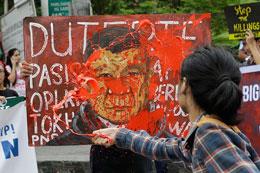Duterte is destroying democracy say rights groups

Philippine President Rodrigo Duterte has asked Congress to extend martial law across the southern third of the country until the end of next year to combat Islamist militants and communists.
The move comes amidst global protests against the Southeast Nation’s strongman’s administration whom human rights groups described a “full-blown dictatorship”.
In a letter to lawmakers released by his office, Duterte said extending martial law was necessary in the southern region of Mindanao to contain an ongoing rebellion by Islamic State (IS) supporters as well as a rising threat from communist guerillas.
Duterte initially imposed military rule across Mindanao, which covers the southern third of the country and is home to about 20 million people, in May to quell an uprising by IS supporters in Marawi city.
Hundreds of gunmen rampaged through Marawi, the mainly Catholic Philippines’ Islamic capital, in what authorities said was part of a campaign to establish a Southeast Asian caliphate for IS.
A US and Chinese-backed military campaign took five months to defeat the militants, with the conflict claiming more than 1,100 lives and leaving large parts of Marawi in ruins.
I ask the Congress of the Philippines to further extend the proclamation of Martial
Although Duterte declared in October that Marawi had been “liberated” and military chiefs said most militant leaders had been killed, authorities have continued to warn that others who escaped are regrouping and recruiting in Mindanao.
The initial period of martial law was limited by the constitution to 60 days. But lawmakers in July endorsed an extension until the end of this year.
Martial law is an extremely sensitive issue in the Philippines, after dictator Ferdinand Marcos used military rule as a key weapon in holding onto power a generation ago.
Duterte, who has praised Marcos, has repeatedly said he may impose martial law across the entire nation.
Rights groups and other critics warn Duterte is destroying democracy in the Philippines with strongman rule and a war on drugs that has claimed thousands of lives.
But many Filipinos continue to support Duterte, believing tough tactics are needed to solve deep-rooted problems such as the decades-long conflicts with Islamist militants and communists.
Duterte enjoys overwhelming support in both houses of Congress.
Rights group Karapatan last weekend held a rally in Mendiola, Manila to protest policies of the Duterte administraton that they described as “recipes” for a “full-blown dictatorship”.
Karapatan secretary general Cristina Palabay called President Rodrigo Duterte a "wannabe dictator" and said "his recipes, composed of fascist policies such as the drug war campaign, counter-insurgency program Oplan Kapayapaan, and martial law in Mindanao, have choked the Filipino people."
The group staged a mock cooking showing to depict how the president is supposedly concocting a dictatorship.
“Blood is spewn by ordinary citizens as the Duterte regime and his State security forces prepares and forcefully shoves poison down people’s throats,” Palabay said.
Karapatan had earlier said that from July 2016 to October 2017, it has documented 104 victims of extrajudicial killings under Duterte’s counter-insurgency program. The group said this is on top of more than 7,000 extra-judicial killing cases in connection with the administration's war on drugs.
The government only acknowledges a little more than 3,900 deaths in anti-drug operations. Other deaths have been blamed on vigilantes and on gang rivalries.
Movement Against Tyranny, of which Karapatan is part, and other groups stage protest rallies in various areas in Manila. The rallies culminated in a torch march from Bonifacio Shrine to Mendiola
Karapatan said protests were also held in the provinces especially in Aklan, Capiz, Iloilo and in the Bicol region.
The group said provinces in Ilocos Region and Central Luzon are also set to hold protest rallies while Cordillera-based organizations will hold a human chain at Session Road in Baguio City.
Karapatan said various organizations in at least 11 areas including Japan, Hong Kong, South Korea, Canada, Australia, US, Italy, Belgium, France, Germany and the Netherlands are also set to hold activities to protest the human rights situation in the Philippines.






